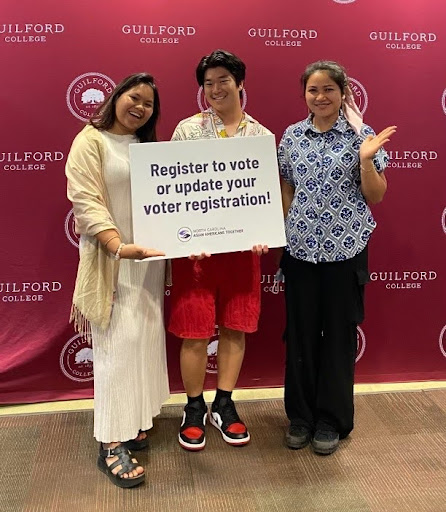Panel discusses Greek life as part of Black History Month
On Wednesday, Feb. 13, from 3:00 p.m. to 4:00 p.m. in the West Gallery of Founders Hall, members of different fraternities and sororities were invited to discuss Greek life on college campuses as part of Black History Month at Guilford.
Greek life is an aspect of college campus life that draws students to a specific campus. Once those students are on campus, they will go through different recruitment stages that will help them determine what fraternity or sorority they belong to. This is an important decision for any new member to make because they will call that house their home and the other members their family.
The panelists consisted of five members of the Divine Nine, which are the nine African American social organizations that make up the National Pan-Hellenic Council. Many of these organizations were founded in the early 1900s in many northern parts and states of the country including New York, Washington, D.C., Indiana and Maryland. Although the Divine Nine are nine separate organizations, each group treats the other like brothers and sisters.
The members of the Divine Nine include the first organization that was founded, Alpha Phi Alpha Fraternity, which started in 1906, followed by Alpha Kappa Alpha Sorority in 1908, Kappa Alpha Psi Fraternity and Omega Psi Phi Fraternity in 1911, Delta Sigma Theta Sorority in 1913, Phi Beta Sigma Fraternity in 1914, Zeta Phi Beta Sorority in 1920, Sigma Gamma Rho Sorority in 1922, and finally Iota Phi Theta Fraternity in 1963.
The discussion started with a “Greek Glossary,” where the panelists began asking attendees about their knowledge on the list of terms provided. Next, each member of the panel was asked to introduce themselves by giving their name, organization, crossing years and line names. The line names refer to the nicknames that the organizations give to their members based on their personalities or what they bring to the community. Panelists also provided a brief history of their respective organization. For organizations that were not represented by panelists, a brief history of those groups was still presented.
For many members of the Divine Nine Greek organizations, their organization’s history and current activities are a source of pride. The panelists at the discussion addressed different organizations’ efforts to remain united and provide a space for students during times of racial segregation and disputes between different cultures and nationalities. As such, members still believe that one must put in the work to uphold the mission of their chosen organization in order to rightfully be a part of that sorority or fraternity.
In addition to the history of the various organizations, the panelists also addressed how they initially determined which fraternity or sorority they wanted to be a part of. Many of the panelists shared stories of connecting to their organization through friends or family who were also members. The panelists also described the immediate feeling of home when they were introduced to their chosen organization.
Although Guilford does not offer Greek life to students, many attendees found value in attending the panel discussion.
“I got a good feeling from the discussion and was interested in learning more about Greek life, but not necessarily joining an organization,” said junior Aeryal Ceaser.
The decision to not offer Greek life at Guilford originated in 2013, after the conclusion of a debate hosted by the Campus Activities Board. At the time, the argument against Greek life organizations was that the presence of fraternities and sororities could encourage or facilitate illicit behavior, such as drinking and drug use, among students.
The CAB debate also concluded that having fraternities and sororities could go against the values and traditions that Guilford seeks to uphold.
“I don’t know much about many of the (Greek life) organizations but I think there are some of the organizations that do a lot of good in the community and do community outreach,” said senior Samantha Brooks. “But I think that Guilford strives to have inclusiveness in every people group. I feel like Greek life may provide more of a divide amongst the community, that’s just what I’ve heard and my perceptions about Greek life, but I also don’t have that much experience with that sort of stuff.”
Senior Finn Shepard expressed similar sentiments on the topic.
“I think Greek life seems pretty outdated and it’s just a way to kind of surround yourself with all like-minded people,” Shepard said. “I don’t think it belongs on Guilford’s campus.”








